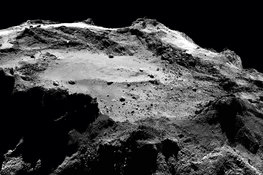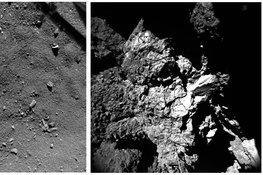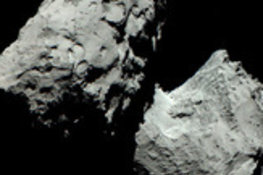Rosetta
A European space probe explores 67P/Churyumov-Gerasimenko and illuminates our knowledge of comets and the origins of the solar system.
For a decade, the European Space Agency's Rosetta spacecraft has flown through the vastness of space. Now it is ever closer getting to its target: 67P/Churyumov-Gerasimenko - a comet full of surprises. Its nucleus, for example, is similar to a rubber duckie. Scientists are therefore eagerly waiting for August 6, when Rosetta will enter into orbit around the celestial body. And in November Philae will land on its surface.
The sight of a bright comet has fascinated people at all times. But what is behind such a celestial spectacle? It was only in modern times that researchers discovered the phenomenon - by which time the tail stars had already had a long career as bringers of bad luck or divine messengers.
more
Rearchers analyse which chemical elements make up comet 67P/Churyumov-Gerasimenko
more
An interview with Holger Sierks from the Max Planck Institute for Solar System Research on the end of the Rosetta mission
more
The European space probe’s successful mission ended on the surface of 67P/Churyumov-Gerasimenko
more
The measurements made by the Philae lander on Churyumov-Gerasimenko provide initial results
more
Some of the dust jets emitted from Rosetta’s comet can be traced back to active pits on its surface. They could be the remnants of collapsed cavities
more
Yearbook research report 2015 - Max Planck Institute for Solar System Research
more
The lander of the Rosetta mission is awake and sending back data from the surface of the comet 67P / Churyumov-Gerasimenko
more
Measurement results from ESA’s space probe provide a comprehensive picture of 67P/Churyumov-Gerasimenko
more
After the Philae lander was separated from Rosetta on 12 November, it remained in view of its mother space probe
more
Show more









